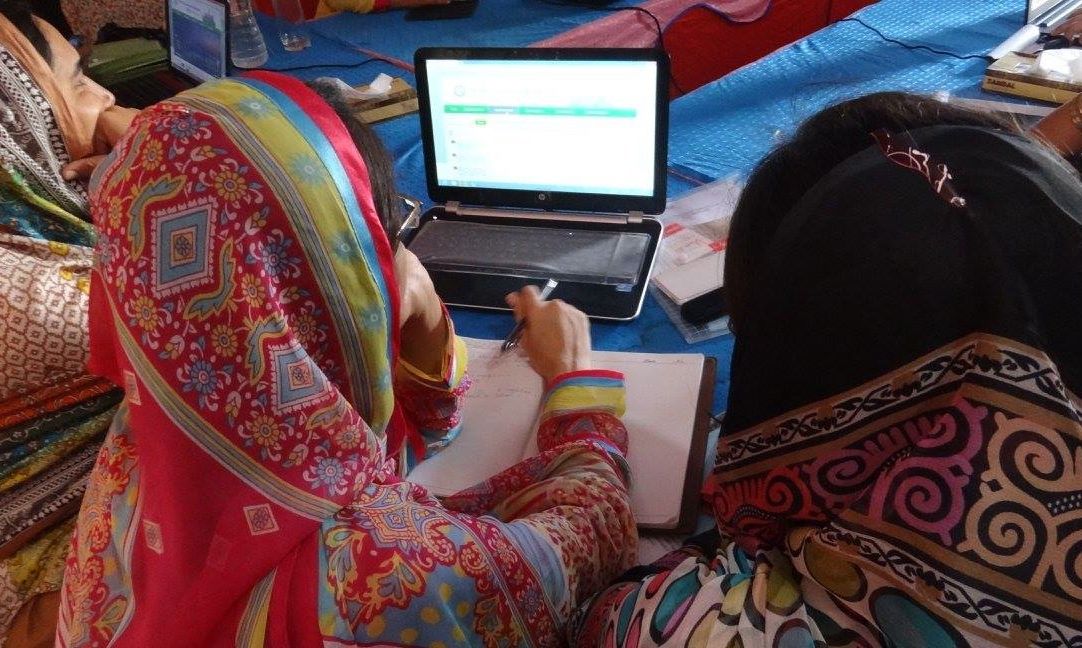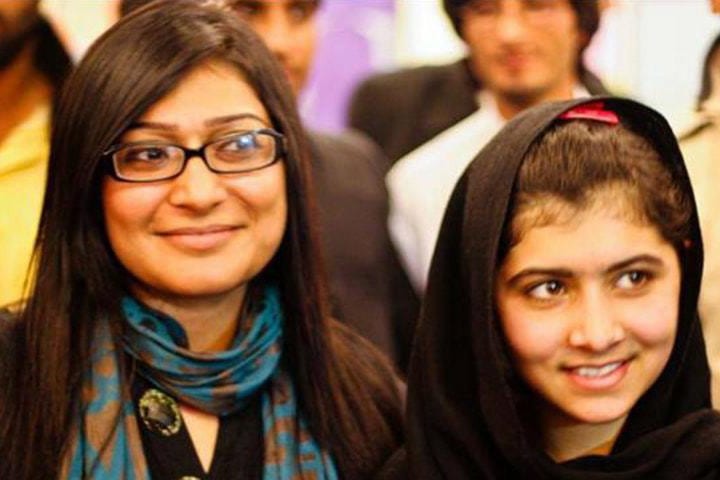How one Pakistani woman is helping keep politicians honest, young women's online voices safe and the country's infamous intelligence agencies more transparent.
Nighat Dad does not claim to be a superhero. But she does play the part for thousands of women across Pakistan when it comes to digital safety.
As Executive Director and founder of the Digital Rights Foundation (DRF), the Lahore-based lawyer has been teaching women and girls across the country how to stay safe online – a major concern in a nation where, for some, “dishonouring” one’s family can have deadly results.
Dad has also been lobbying for better legislative protections for all of Pakistan’s online users for a number of years, as well as demanding more accountability and transparency from the government’s infamous intelligence services.
Through these efforts, she has become not only a prominent voice on these issues, but also a respected partner among the many local and international organisations she works with.
And it’s not just peers and politicians who are taking notice: TIME magazine named her as one of its Next Generation Leaders in 2015.
IFEX spoke to Dad by phone from her home in Lahore. The conversation came on the heels of three recent developments that illustrate the growing challenges for free expression in Pakistan: the release of a report by Privacy International shedding light on the tapping of communications by the country’s intelligence agency, leaked e-mail exchanges between the Pakistani authorities and Hacking Team, and a ban on Blackberry services because of its use of strong encryption.
These are just a few indications of how fragile the environment for free expression online is in Pakistan; and a reminder why activists like Dad play such a pivotal role for thousands of women and men across that country.
IFEX: You have been advocating for the right to free expression online for a number of years. How would you describe people’s attitudes towards this issue in Pakistan?
ND: Looking back at how the conversation about digital rights began in Pakistan, in the beginning there was resistance. It was a slow, gradual process for people to understand that human rights also apply to the online sphere. After all, Article 19 of Pakistan’s Constitution protects freedom of speech and expression.
At the same time, people began to notice that a lot of content was being blocked, under the excuse that it was anti-Islamic, or blasphemous or anti-state – when the motivation for that censorship was really political.
One can see a visible change in terms of who is engaged in the issues now. When content is blocked or violations are committed nowadays, a broad range of people react and respond – not just digital rights activists.
IFEX: We were very saddened to hear of the assassination of activist Sabeen Mahmud earlier this year. You had a close connection to her, and even held a Feminist Hackathon in her honour. How do you think her murder has affected activists in Pakistan?
ND: I was very much affected by her killing – all of us who worked closely with her were shocked. She was an amazing activist, very passionate and very brave. She did a lot to enhance the debate in Karachi around digital issues and around the silencing of news in Balochistan.
At first, I considered giving up this work. I was so discouraged. But after a few days, I realised that would mean giving in to her killers, whose aim was to silence activists. So the best thing to do was to continue the work, and to speak out on issues she addressed.
IFEX: Online harassment and violence against women often make the headlines in Pakistan. How is your organisation helping to address this issue?
ND: DRF organised a massive awareness campaign for young women and girls. We want them to understand that harassment online is another form of violence, and to teach them how to use technology in a safer way.
When women are harassed or face threats online, there is no functioning legal remedy for this in Pakistan. Moreover, they tend not to tell their families, as many male relatives tend to disapprove of their online activity in the first place. They are also unlikely to go to the police to file a complaint. So, quite often what happens is that they resort to ceasing all their activity online when they run into trouble.
That’s why it’s important for us to also talk to male members of the family. We focus on safe communication techniques and legal instruments to help women. When we stress that, the approach has been successful with men, even patriarchal ones. Of course, you have to be aware of the language you are using and ensure it does not challenge cultural values.
Capacity building with authorities around these issues is also needed. We are currently working with the Punjab Commission on the Status of Women. DRF is training staff at their Call Centre so that they are able to respond when they receive complaints of online harassment from women.
IFEX: Given the inadequacy of legal protections you mentioned, is there an “ideal” law that would help create a better environment online for women?
ND: I am not so convinced anymore about the benefits of cybercrime legislation.
We, as activists, can provide recommendations to the authorities as to the content of the law, drawing on best practices from around the world. But we have to consider who is drafting the law – in other words: the authorities – and how it’s being drafted.
For example, the current provision in the Cybercrime Bill that tackles crimes against women can also be used to curb freedom of expression. It’s a double-edged sword. And it’s not just the Cybercrime Bill: other recently passed legislation, such as the Pakistan Protection Act and the Fair Trial Act, have some provisions that impact Internet freedom.
It is amazing how the Pakistani authorities are putting provisions to control cyberspace in various laws and, at the same time, bringing forward the Cybercrime Bill. The language in all these bills is vague, which leaves a lot of room for misinterpretation.

Participants attend a DRF workshop on “Safe Online Spaces for Women – Hamara Internet” in Muzaffargarh, South PunjabNighat Dad
IFEX: Does this mean you will stop advocating for legislative reforms?
ND: Despite the limitations, we need to raise our voices and be involved in legislative processes where we can.
I was part of the working group advising a parliamentary subcommittee on the Cybercrime Bill. Unfortunately, our concerns and civil society recommendations were not included in the version of the Bill that was recently passed by the National Assembly’s IT Standing Committee. We are continuing to educate Internet users about the dire consequences of such legislations, and we are lobbying senators to resist the bill when it comes to the Senate for final approval.
DRF is also working with the Senate’s Human Rights Committee around a resolution on surveillance activities and disclosures. It’s important for the public to know how much of their money is being spent on this type of technology – and to what end.
The Supreme Court is also hearing a case about phone tapping during which intelligence agencies will be queried on what laws they are using to carry this out. We are not currently involved in this process but would welcome an opportunity to act as amicus curiae to the court or present our research to the Supreme Court judges.
IFEX: What do you think about the revelations of the government’s digital surveillance activities this year?
ND: We first began to suspect that Pakistan was buying surveillance technology in 2005. So this is not altogether surprising.
That said, the current government has successfully controlled the narrative around security, especially since the 2014 Taliban attack on a Peshawar school. It is important for us to challenge conceptions such as “it is okay for the government to spy on us, it’s their job” or “if they are buying surveillance technology, then it’s for our own security”.
IFEX: You have been working with influential international organisations for many years. Most recently, you became a Board Member of Amnesty International’s Advisory Council of Technology and Human Rights Secretariat. How do these international relationships help your work inside Pakistan?
ND: Sometimes they help, sometimes they don’t. There is a common perception that a woman working in civil society or for an NGO is “westernised”. I have to be aware of these concerns. I adopt the local customs when I am in a community and try to avoid disengaging language or development jargon.
And, at times, I may not emphasise my connections with international organisations, as they can result in undue attention.
For example, after meeting with a colleague from Norway, I was recently approached by a man on a motorcycle who said he had been assigned to follow me. He asked questions about who I met and why. It was a very scary experience.
Of course, there are lot of positives to international relations as well. A foundation provided us with seed money to start our project “Hamara Internet”. And my recent recognition from TIME Magazine was well received.
IFEX: You have shared some of the difficulties of working in Pakistan. What are some of the positives?
ND: I have little positive to say about the current government. They promised a lot while they were in opposition, such as unblocking YouTube, but have delivered little.
Nevertheless, there are many positive developments. The role of opposition party members in the IT Standing Committee debate is commendable, especially Shazia Marri, Raza Ali Abidi and Senator Afrasiab Khattak. And, though the government did not amend the Cybercrime Bill based on activists’ recommendations, most senators are against this draconian legislation and will resist the bill once it is presented to the Senate.
Another positive fact is that people find ways to educate themselves about digital issues. And they find ways to share opinions online, despite censorship tactics. Women have been contributing a lot, taking part in international debates as experts. Currently, women like Farieha Aziz of the organisation Bolo Bhi and myself are at the forefront of the debate on the Cybercrime Bill.
IFEX: You face a lot of opposition from conservative ranks and from the government. Where do you find your inspiration to take on these challenges?
ND: I am saddened when women feel compelled to stop using technology because of the harassment they have faced. On the other hand, I feel very encouraged when women in remote areas are empowered to get online and start using the Internet. We need to fight for equal access to technology.
We must continue this fight. We have to – so the upcoming generation won’t say that no one did anything to protect their digital rights.
